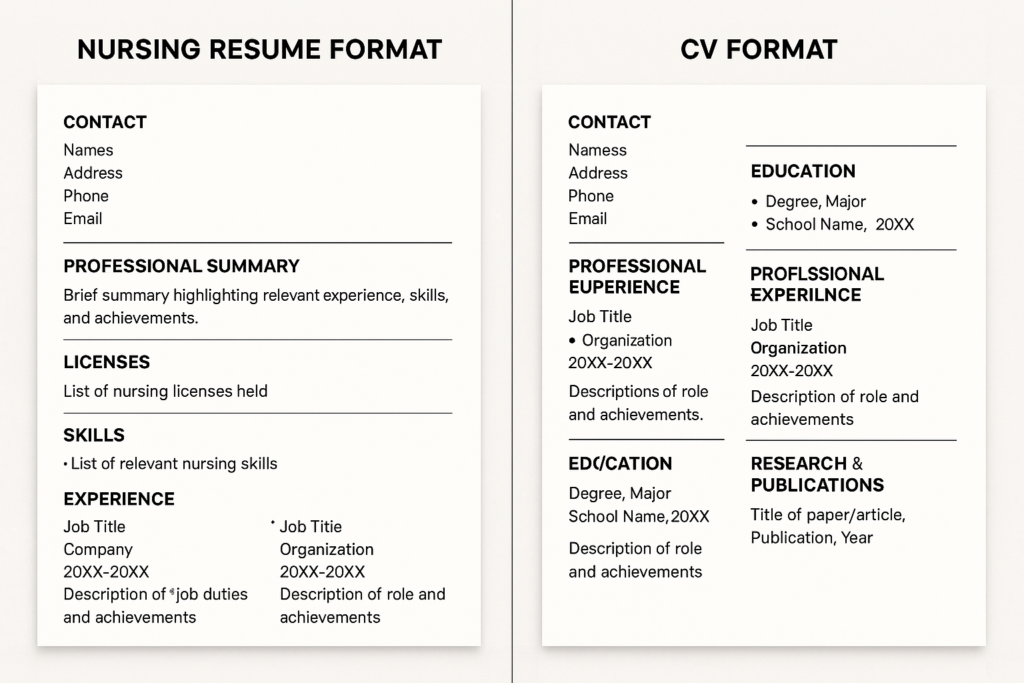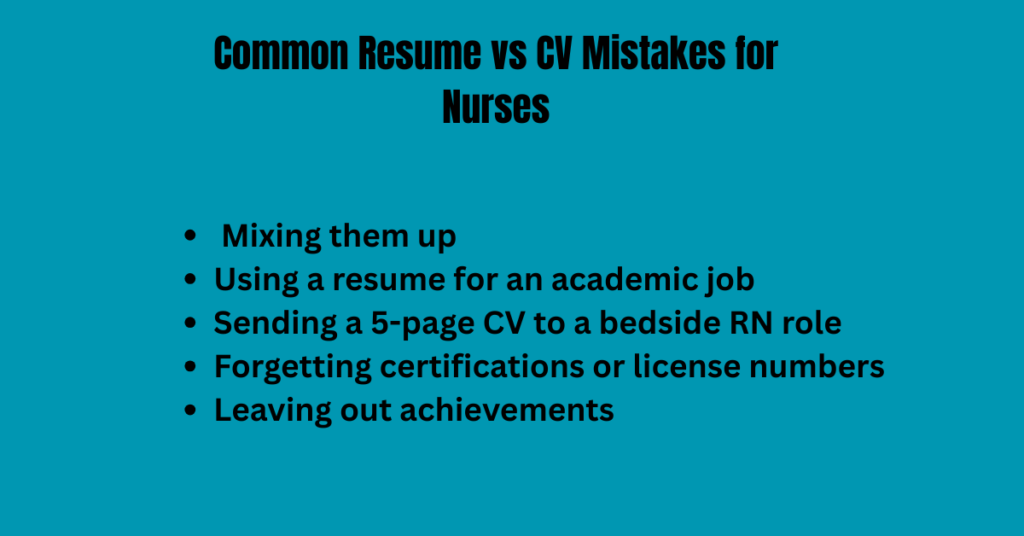Resume vs CV for Nurses: Key Differences & When to Use Each
“I don’t know what to submit. A resume or a CV?”
That’s what Amy, a nurse with three years of experience, asked during our session. She was applying for a research assistant job at a hospital in the UK and felt totally confused.
You might feel that way too. Don’t worry. You’re not alone.
I’ve worked with hundreds of nurses from all walks of life — fresh grads, seasoned RNs, international applicants, educators, and travel nurses. And one of the biggest sources of confusion is this: Resume vs CV for nurses.
So, let’s clear that up.
This isn’t going to be dry or technical. I’m walking you through this like we’re sitting at a coffee shop. I’ll break down what each document is, how they’re used, what to include, and which one is right for your situation.

What Is the Difference Between a Nurse Resume and a CV?
Let’s start simple.
- A resume is short (1–2 pages). It’s tailored for a specific job. Think of it like a highlight reel.
- A CV (curriculum vitae) is long and detailed. It covers your full professional history. Think of it like your career storybook.
If you’re applying to a clinical nurse job in the U.S., use a resume.
If you’re applying for a nurse educator job, research fellowship, or academic role — go with a CV.
Nursing Resume Format vs CV Format (Side-by-Side)
| Resume | CV |
|---|---|
| 1–2 pages | Can be 3+ pages |
| Tailored to the job | Full career history |
| Focused on skills & outcomes | Includes publications, teaching, research |
| Used in clinical/acute care settings | Used in education, academia, or international roles |
| Often in U.S./Canada | Common in UK, EU, academic roles |
When Should Nurses Use a Resume?
Use a resume when applying for:
- RN jobs in hospitals or clinics
- Nurse practitioner roles
- Travel nursing contracts
- Private care agencies
- Staff nurse positions in the U.S. or Canada
Resume Quick Tip: Keep it concise. Use bullet points. Show results (e.g., “Reduced medication errors by 25% through double-check protocol”).
When Should Nurses Use a CV Instead?
Use a CV when applying for:
- Nurse educator or faculty positions
- Graduate nursing programs
- Research assistant or academic roles
- Nursing positions in countries like the UK or Australia
- Visa or immigration processes (in some cases)
True Story:
When I helped Jasmine apply for a nurse lecturer role in London, we used a CV. We added her teaching assistant work, published thesis, and conference presentations. That made all the difference.
What to Include in a Nurse Resume
- Contact Info
- Resume Summary
- Licenses & Certifications
- Clinical Experience
- Key Nursing Skills
- Education
- Optional: Volunteer Work, Language Skills, Achievements
What to Include in a Nurse CV
- Contact Info
- Career Objective or Summary
- Full Work History (no skipping!)
- Education + Continuing Ed
- Certifications and Licensure
- Research Experience
- Teaching or Presentations
- Publications
- Conference Attendance
- Professional Memberships
- Awards/Honors
💡 Boost Your Nursing Resume the Right Way:
Want to stand out in a sea of applicants? Learn how to add certifications to your nursing resume (with real examples), discover the top soft skills every nurse should highlight, and understand whether a resume objective or summary gets more interviews. These tips can dramatically improve your chances of getting hired—don’t miss out!
How Long Should a Nursing Resume or CV Be?
- Resume: 1 page if you’re new. 2 pages max if you have lots of experience.
- CV: 2–5+ pages depending on your background.
Pro Tip: Don’t fluff. Add real accomplishments, not just duties. Instead of:
Responsible for patient care Say: Provided daily wound care to 10+ post-op patients, reducing infection rates by 20%
Should I Use a CV for International Nursing Job Applications?
It depends on the country.
- Canada: Use a resume format.
- UK/Europe: CVs are preferred. In fact, they often call resumes “CVs.”
- Australia/New Zealand: CVs or resumes work, but longer formats are accepted.
Nursing CV Example for International Jobs:
Registered Nurse | King Faisal Hospital | Kigali, Rwanda | 2019–2023
- Monitored post-op recovery in surgical ward
- Led infection control trainings for junior staff
- Participated in WHO-sponsored malaria awareness campaign
Education
- BSc Nursing – University of Nairobi, Kenya – 2018
Certifications
- IELTS Academic: Band 7.5 (Feb 2023)
- NMC Registration in Progress (UK)
When Hospitals Prefer Resumes vs CVs for Nursing
- U.S. Hospitals: Resume. Short, focused.
- UK NHS Roles: CV. Long-form accepted.
- Nursing Schools or Teaching Jobs: CV. Include everything.
Nurse CV vs Resume for Nurse Practitioner Roles
If you’re applying for an NP job in a clinical setting? Resume.
But if you’re applying for an NP fellowship, graduate school, or academic/research role? Use a CV.
Frequently Forgotten Things to Add:
- Volunteer work: Even if it’s not clinical, it shows heart.
- Languages: Helpful for international or multicultural settings.
- Tech skills: Familiar with Epic, Cerner, or Telehealth tools? Add them.

Common Resume vs CV Mistakes for Nurses
- Mixing them up
- Using a resume for an academic job
- Sending a 5-page CV to a bedside RN role
- Forgetting certifications or license numbers
- Leaving out achievements
FAQs
Q: What’s the difference between a nurse resume and a nurse CV? A: A resume is short and job-specific. A CV is detailed and includes your full career, often used in academic or international settings.
Q: When should nurses use a CV instead of a resume? A: Use a CV for teaching, research, international jobs (UK, EU), or graduate school. Use a resume for clinical roles.
Q: How long should a nursing resume or CV be? A: Resumes = 1–2 pages. CVs = 2–5+ pages depending on experience.
Q: Should I use a CV for nurse educator roles? A: Yes! Include teaching experience, course development, presentations, and any publications.
Final Words from Someone Who’s Helped Nurses at Every Stage
If you’re still wondering, “Resume or CV?” — let me say this:
You already have what it takes. The challenge is organizing it in the way that hiring teams expect.
Once you understand the difference and when to use each, everything gets easier. You start to own your story instead of shrinking it.
Want a head start? Try our free nurse resume and CV Builder. They’re clean, easy to use, and built to help you get seen.
You’re not behind. You’re right on time.




Pingback: Resume for Nurses Applying Abroad: Real Tips That Actually Work - Best Resume Creator